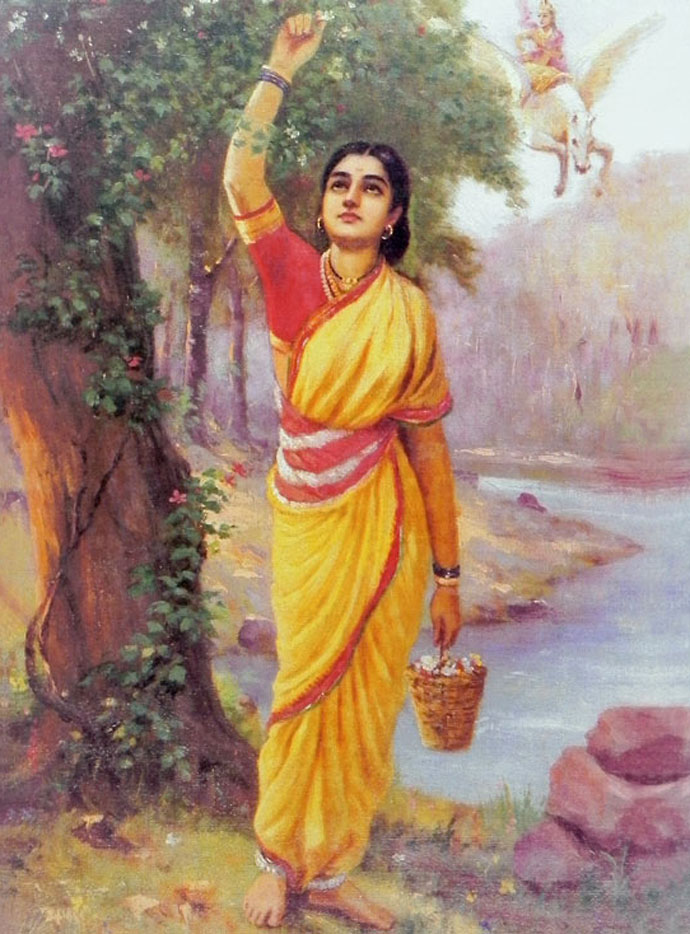|
Sita Rama Kalyanam (1961 Film)
''Sita Rama Kalyanam'' () is a 1961 Indian Telugu-language Hindu mythological film directed by N. T. Rama Rao in his directorial debut. It stars N. T. Rama Rao, Haranath, Geetanjali, B. Saroja Devi, Kanta Rao, Sobhan Babu. The film was produced by N. Trivikrama Rao on 'National Art Theatres' banner. The music composed by Gali Penchala Narasimha Rao. The film was a commercial success. It also won the Certificate of Merit for Best Feature Film in Telugu at the 8th National Film Awards. The film was dubbed into Tamil with the same title and was released on 3 February 1961. Plot The film begins with the demon king Ravana visiting Kailasa, the abode of Lord Siva, at an inopportune time. He is obstructed by the guardian deity Nandi who warns him against going in and disturbing Siva's privacy. A rift between them forces an enraged Nandi to curse Ravana that an army of monkeys would destroy him. In retaliation, Ravana decides to uproot Kailasa and uses all his strength to do so. S ... [...More Info...] [...Related Items...] OR: [Wikipedia] [Google] [Baidu] |
Samudrala Sr
Samudrala Raghavacharya (19 July 1902 – 16 March 1968), also known as Samudrala Sr., was an Indian screenwriter, lyricist, playback singer, director, and producer known for his works in Telugu cinema. Samudrala Senior made his screen debut in 1937, and known for his collaborations with Ghantasala. grand son samudrala srinivaas Personal life Samudrala Raghavacharya was born in 1902, in Pedapulivarru, Repalle Taluk, Andhra Pradesh, India. Filmography Writer # ''Kanakatara'' (1937) (debut) (dialogues and lyrics) # '' Gruhalakshmi'' (1938) # ''Vande Mataram'' (1939) (dialogue) # '' Sumangali'' (1940) (dialogue) # '' Devata'' (1941) (dialogue) # ''Bhakta Potana'' (1942) (story and dialogue) # '' Chenchu Lakshmi'' (1943) (story and dialogue) # ''Garuda Garvabhangam'' (1943) (dialogue) # ''Palnati Yudham'' (1947) (dialogue) (screen adaptation) # ''Ratnamala'' (1947) # '' Yogi Vemana'' (1947) # '' Mana Desam'' (1949) (dialogue) # ''Laila Majnu'' (1949/I) (adaptation) (dialogue) # ... [...More Info...] [...Related Items...] OR: [Wikipedia] [Google] [Baidu] |
Vishnu
Vishnu ( ; , ), also known as Narayana and Hari, is one of the principal deities of Hinduism. He is the supreme being within Vaishnavism, one of the major traditions within contemporary Hinduism. Vishnu is known as "The Preserver" within the Trimurti, the triple deity of supreme divinity that includes Brahma and Shiva. Gavin Flood, An Introduction to Hinduism' (1996), p. 17. In Vaishnavism, Vishnu is the supreme being who creates, protects, and transforms the universe. In the Shaktism tradition, the Goddess, or Adi Shakti, is described as the supreme Para Brahman, yet Vishnu is revered along with Shiva and Brahma. Tridevi is stated to be the energy and creative power ( Shakti) of each, with Lakshmi being the equal complementary partner of Vishnu. He is one of the five equivalent deities in Panchayatana puja of the Smarta tradition of Hinduism. According to Vaishnavism, the highest form of Ishvara is with qualities ( Saguna), and have certain form, but is limit ... [...More Info...] [...Related Items...] OR: [Wikipedia] [Google] [Baidu] |
Ahalya
In Hinduism, Ahalyā ( sa, अहल्या, IAST: Ahalyā) also known as Ahilya, is the wife of the sage Gautama Maharishi. Many Hindu scriptures say that she was seduced by Indra (the king of gods), cursed by her husband for infidelity, and liberated from the curse by Rama (7th avatar of the god Vishnu). Created by the god Brahma as the most beautiful woman, Ahalyā was married to the much older Gautama. In the earliest full narrative, when Indra comes disguised as her husband, Ahalyā sees through his disguise but nevertheless accepts his advances. Later sources often absolve her of all guilt, describing how she falls prey to Indra's trickery. In all narratives, Ahalyā and Indra are cursed by Gautama. The curse varies from text to text, but almost all versions describe Rāma as the eventual agent of her liberation and redemption. Although early texts describe how Ahalyā must atone by undergoing severe penance while remaining invisible to the world and how she is ... [...More Info...] [...Related Items...] OR: [Wikipedia] [Google] [Baidu] |
Maricha
In the Hindu epic ''Ramayana'', Maricha, or Mareecha (Sanskrit: मारीच, IAST: ) is a demon, who was killed by Rama, the hero of the epic and an avatar of Lord Vishnu. He is mentioned as an ally of Ravana, the antagonist of the epic. His most notable exploit is his role in the kidnapping of Sita, Rama's wife. His son Kalanemi was killed by Hanuman. Cursed to be a rakshasa along with his mother Tataka and brother Subahu, Maricha initially led his life terrorizing sages. He was defeated by Rama at the behest of the sage Vishvamitra. He tried again to kill Rama, but had to run for his life again. Ultimately, Maricha assumed the form of a golden deer and helped Ravana kidnap Sita. Early life Maricha was the son of the demon Sunda (son of Jamba or Jharjha) and a Yakshini named Tataka, also known as Taraka, Tadaka or Thataka. Tataka was the daughter of the yaksha king Suketu, who had gained her as a blessing from the god Brahma. Maricha also had a younger brother called ... [...More Info...] [...Related Items...] OR: [Wikipedia] [Google] [Baidu] |

